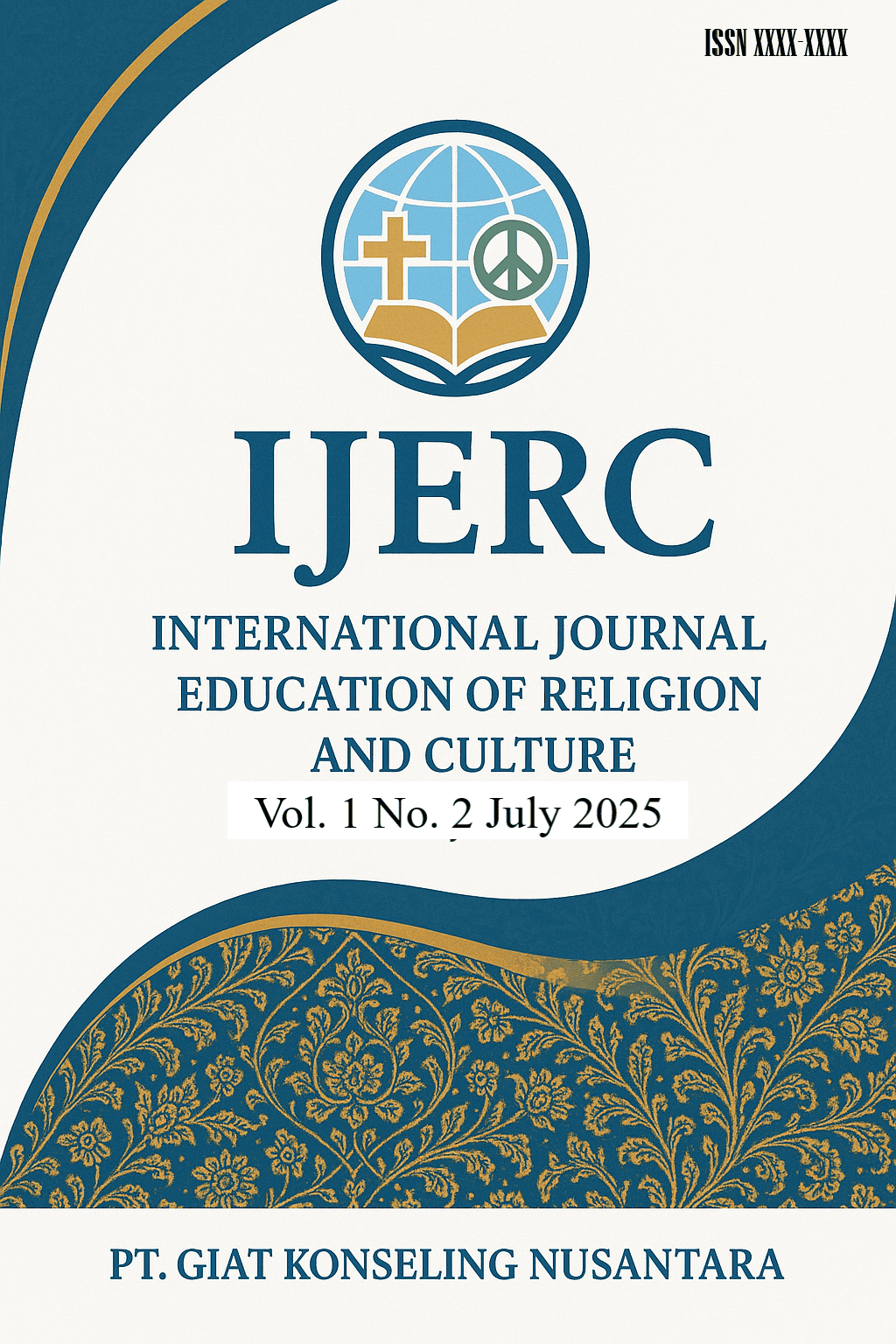Ecological Sin and Cosmic Repentance: A Synthesis of Soteriology and Ecotheology in Light of Justification and Sanctification
Keywords:
Ecological Sin, Justification, Sanctification, Cosmic Repentance, Pneumatology, Ecological SpiritualityAbstract
The deepening global ecological crisis calls for a theological response that goes beyond moralistic or technical approaches. This article proposes a soteriological-ecotheological framework that integrates the doctrines of justification and sanctification as the theological foundation for cosmic repentance. Ecological sin is understood as a violation against the work of the Triune God, specifically, the destruction of creation shaped by the Word and the rejection of the Holy Spirit’s sustaining presence within the cosmos. Within this framework, justification is viewed as the restoration of humanity’s relationship not only with God but also with creation, while sanctification is conceived as the transformative process toward ecological love and restorative action in the world. The model of cosmic repentance presented here involves both passive (ceasing to harm) and active (loving and healing the earth) dimensions, positioning believers as the body of Christ and agents of the Holy Spirit in the renewal of creation. By cultivating an ecological spirituality rooted in eschatological hope, this article affirms that Christian salvation entails not only vertical reconciliation with God but also active participation in the healing of a wounded world, as part of the fulfillment of God’s redemptive work in Christ and the Spirit. Using a conceptual-theological approach within the tradition of systematic theology, this study aims to construct a normative framework that bridges soteriology and ecotheology, providing a theological foundation for the Church’s spiritual and ethical engagement in responding to today’s ecological crisis.
References
Adiprasetya, J. (2023). Berteologi dalam Iman: Dasar-dasar Teologi Sistematika-Konstruktif. BPK Gunung Mulia.
Calvin, J. (1998). Institutes of the Christian Religion, Vol. 1 (Ford Lewis Battles (ed.)). The Westminster Press.
__________. (1998). Institutes of the Christian Religion, Vol. 2 (Ford Lewis Battles (ed.)). The Westminster Press.
__________. (1998). Institutes of the Christian Religion, Vol. 3 (Ford Lewis Battles (ed.)). The Westminster Press.
__________. (1998a). Institutes of the Christian Religion, Vol. 4 (Ford Lewis Battles (ed.)). The Westminster Press.
Conradie, E. M. (2006). Christianity and Ecological Theology: Resources for Further Research. African Sun Media.
Ellis, G. N., & Wheaton, I. (2009). Distinction Without Separation: The Milieu of John Calvin’s Doctrine of Union with Christ and the Duplex Gratia of Justification and Sanctification. In Wheaton College Graduate School.
Görföl, T. (2025). A Doctrinal and Practical Continuity: Pope Benedict XVI and Pope Francis on the Ecological Crisis. Religions, 16(2).
Habel, N. C. (2001). The Earth Story in the Psalms and the Prophets. In Paper Knowledge . Toward a Media History of Documents. Sheffield Academic Press Ltd, Mansion House.
Lahtinen, H. (2025). Beyond the Anthropocene: Construction of Human Agency within Lutheran Eco-Theology. Dialog, 1–7.
Lala, I. (2025). Eco-Theological Anthropology in Christianity: Imago Dei and Ecological Preservation. HTS Theological Studies, 81(1), 1–8.
Luther, M. (1531). Commentary On St. Paul’s Epistle to The Galatians. In P. S. WATSON (Ed.), The University of Wittenberg.
__________. (1961). The Freedom of a Christian. In The Freedom of a Christian.
Mics, F. (2025). The Importance of Forests and Natural Habitats-Ecotheological and Human-Ecological Aspects. Opuscula Theologica et Scientifica, 3(1), 75–95.
Pihkala, P. (2025). Ecological Grief, Religious Coping, And Spiritual Crises: Exploring Eco-Spiritual Grief. Pastoral Psychology, 74(1), 69–96.
Runtuwene, H. C. M. (2025). Ecotheology: Integrating Faith, Creation Care, and Contextual Practice in Indonesian Protestant Congregations. Educatio Christi, 6(1), 145–170.
Sadowski, R. (2025). The Role of Christianity in Ecological Awakening: Foundations for Christians’ Sustainable Behavior Toward Nature. Problemy Ekorozwoju, 20(1), 15–24.
Scaer, D. P. (1985). Sanctification in Lutheran Theology. Concordia Theological Quarterly, 49(2–3), 181–195.
Sitohang, B. (2019). Refleksi Kristologi Kosmik Dalam Laku Iman Yang Ekologis. Jurnal Teologi Anugerah, 8(2), 53–72.
Snider, A. V. (2010). Sanctification and Justification: A Unity of Distinctions. Master’s Seminary Journal, 21(1), 59–26.
Tappert, T. G. (2016). Buku Konkord: Konfesi Gereja Lutheran. BPK Gunung Mulia.
Williams, D. T. (2013). Ecological Disharmony as the Sin Against the Spirit. Scriptura: Journal for Contextual Hermeneutics in Southern Africa, 112(1), 1–13.
Downloads
Published
Issue
Section
License
Copyright (c) 2025 Authors

This work is licensed under a Creative Commons Attribution 4.0 International License.







